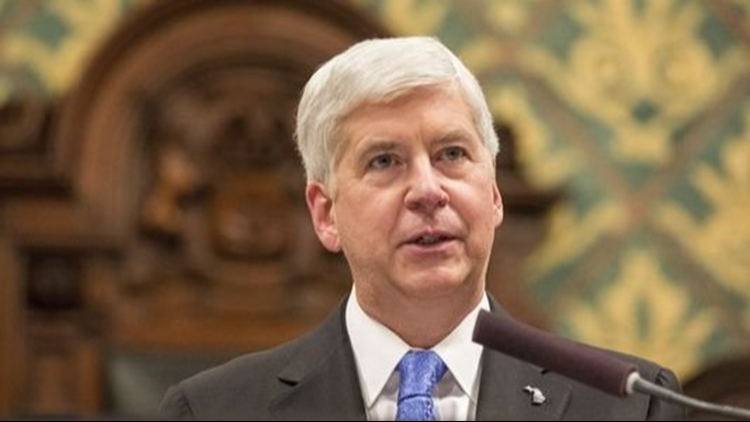LANSING – Gov. Rick Snyder, who signed his final state budget Thursday, has overseen huge changes in how state government raises and spends money — including a massive shift in the tax burden from corporations onto individuals — during his two four-year terms, state records show.
The changes aren’t that striking from one year to the next, but comparing current numbers to those when he took office tells a different story.
Among the highlights drawn from the state’s Comprehensive Annual Financial Report for the 2011 and 2017 fiscal years:
- Despite a much healthier economy, corporate taxes shrunk by $1.2 billion, or 57.1 percent, from 2011, when Snyder took office, to 2017, the most recent year for which the state has published a comprehensive financial report. Corporate taxes made up 12.2 percent of state general fund revenues in 2011, compared to 6.4 percent in 2017. This is mostly a result of the elimination of the Michigan Business Tax and an ongoing phase-out of personal property taxes on manufacturing equipment. When net corporate income tax revenue is considered, after hundreds of millions of dollars paid out annually in legacy corporate tax credits is accounted for, the plunge in corporate tax revenue is even more dramatic.
- Personal income tax revenues surged by $2.5 billion, or 32 percent, between 2011, when they made up 47 percent of state general fund revenues, and 2017, when they made up 53 percent of the money going into the state’s main checking account. This is largely a result of a tax on pension income that took effect in 2012, a much improved economy, and the elimination or reduction of certain personal income tax credits and deductions. In February, Snyder signed into law bills to increase income tax personal exemptions, but the effects of that modest tax cut are not yet reflected in the data.
- State health care spending increased 31 percent from 2011 to 2017 — a result of higher health care costs, the 2013 Michigan Medicaid expansion under the Affordable Care Act, and a vastly expanded dental program for eligible children. Total expenditures related to government activities rose 8.9 percent during that period — roughly keeping pace with inflation.
- Total education spending — including K-12, community colleges, and universities — increased from $15.3 billion in 2011 to $16.1 billion in 2017, records show. That's a 5.5 percent increase that has not kept pace with inflation, despite significant growth in the School Aid Fund. Reasons include the disappearance of federal stimulus funds that were made available at the end of the recession and a 15 percent cut to higher education in Snyder's 2012 budget that has only just been restored, state Budget Office spokesman Kurt Weiss said Thursday.
- Spending on human services has dropped 25 percent — a result of vastly reduced welfare rolls and tighter state policies on dispensing such help.
Snyder said Thursday he's proud of his string of eight budgets, particularly the fact that they've been completed by the end of June to give local governments time to plan, and the investments they've made in roads, education, health care and other priorities.
The amount of corporate taxes is "reasonably good" but the numbers are being dragged down by corporate tax credits issued before he took office, he said. Those credits will all expire by 2028 or 2029 and the state will then have more revenue to work with, he said.
"Michigan is doing well in terms of job creation," and "our personal incomes have come up dramatically."
Though business groups and some economists say the budget changes have resulted in a vastly improved business climate that will strengthen Michigan's economy, critics say the shift in the tax burden means corporations are not paying their fair share and the state does not have enough revenue to spend on needed services, including schools and roads.
"Businesses consume and benefit from the same services that Michigan residents consume — police, fire services, roads and street lights, and education," said Rachel Richards, legislative coordinator for the Michigan League for Public Policy.
The state's general fund budget is at the level it was in 1968, when inflation is accounted for, and with more revenue growth, "we could be doing a lot more," Richards said.
Instead, the 2015 road funding deal went beyond fuel taxes and registration fees to try to address Michigan's crumbling roads, and as a result, another $600 million will be withdrawn from the state's already strapped general fund, to pay for roads, by 2021, she said.
Patrick Anderson, CEO of the Anderson Economic Group in East Lansing, said the eliminations of the Single Business Tax and the Michigan Business Tax in 2006 and 2011, respectively, were key steps in recently vaulting Michigan into the top 10 best states for businesses on taxes, from one of the worst-ranked states formerly, according to an annual nationwide study conducted by his firm.
Those who say Michigan corporations are not paying their fair share of taxes are not seeing the entire picture, said Anderson, who noted corporations pay significant property taxes and sales taxes on top of corporate income taxes. In Michigan in 2016, $843 million in income received by limited liability corporations and professional corporations such as law firms, was taxed as "pass-through" income on the owners' personal income tax returns, Anderson said.
Michigan's citizens know best whether the state has the revenues it needs to operate, said Anderson, who noted voters overwhelmingly rejected a one percentage point increase in the state's 6 percent sales tax in 2015, but were relatively accepting of a 7-cent-per-gallon hike in the state fuel tax approved later that year, because they knew state fuel taxes are dedicated to road repairs.
Senate Minority Leader Jim Ananich, D-Flint, said, "There's no question the burden has shifted dramatically to individuals from corporations," while at the same time "there are indications our schools are getting measurably worse and our roads are crumbling."
The last seven or eight years have been great for a minority of residents of Michigan, but many of the new jobs created have been low-wage and wages for many of those already working have been stagnant, Ananich said.
"Overall, people aren't really that much better off, unfortunately," he said.
Contact Paul Egan: 517-372-8660 or pegan@freepress.com. Follow him on Twitter @paulegan4.
►Make it easy to keep up to date with more stories like this. Download the WZZM 13 app now.
Have a news tip? Email news@wzzm13.com, visit our Facebook page or Twitter.



